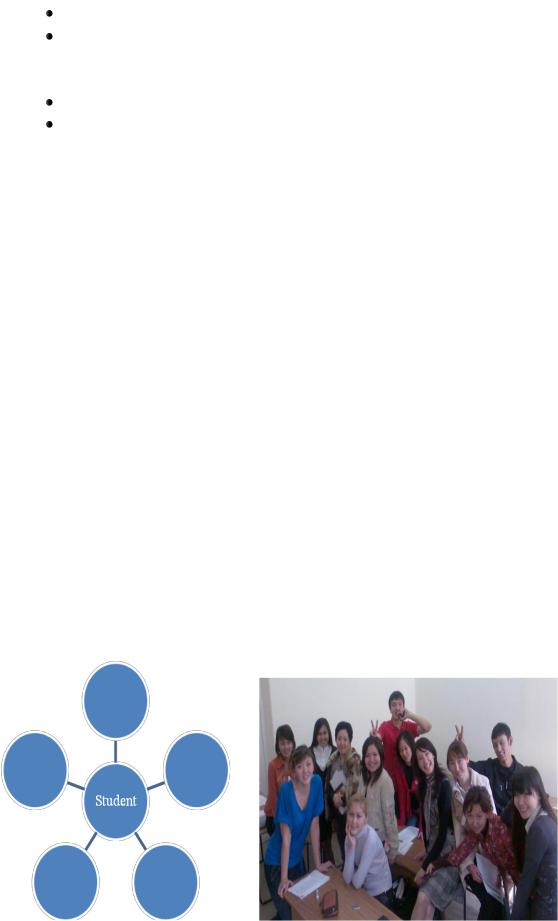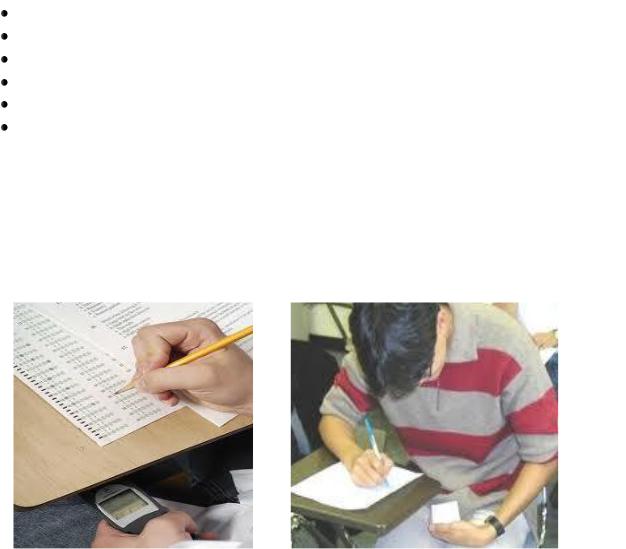
Basic English _Fisrt year_Булатова -31-10-11
.pdf
Experience: Knowledge or skill that one gets from doing something; the experience of working
Qualifications: An ability or experience that makes you suitable for a job or activity Reference: A person who knows you and is willing to describe and usually praise you to support you when you are trying to get a job;
Resume: A short written description of your education, qualifications, and previous employment, which you send to an employer when you are trying to get a job; Skill: The ability to do an activity or job well, especially because you have practiced it
8.Read the sentences and fill in the gaps with words above.
I have ________ working in an office, filing, typing, and answering phones. He wants a _______ in social work.
Although the salary was less than I wanted, I took the job because it had excellent _______.
Her computer teacher gave a good________ for the job.
People interested in applying for the job should send their ______ by mail. Nursing experience is a necessary ________ for this job.
Have you answered all the questions on the ______form?
Looking after my younger brothers gave me great _____ with children.
Reading: Can I work while studying?
Many students think that taking on a part time is hard. It can seem hard to take a part time while at university, but it is possible to do this. With a partner discuss the benefits of working during your university years, and add more ideas.
1.Working can improve your grades
2.Working teaches you time management skills
3.Working can help you to have extra money
4.Working gives valuable job experience
5.Working can ______________
6.Working can_____________
9.Match the sentences with the right parts of the text.
1. _______________________________
Working during university years can help to reduce the sum of money that you have to pay for study. A part time job and careful budget can help to reduce what you your parents pay for your classes.
2. ____________________________________
Find a job in the field that you are going into. This can be valuable and will make you more competitive when you graduate from university. Even job experience that is not directly related to your field may get you a job that someone without your experience
301

could not get. For example, understanding children while working in a kindergarten may be helpful for a job in a toy company.
3. ____________________________________
When you begin working, it is a different environment from the University. You will often have several projects to cope with. Learning to manage your time with classes and work will help you to adapt much more quickly. You will also learn to deal with people at work.
4. _____________________________________
Many students are surprised that their grades increase when they begin working part time. This is a result of learning to organize and plan your study time effectively.
10.Match the boldfaced words in the text with their synonyms. precious
ready for action finances
to be able to fulfill to control
to get used to efficiently
11.Walk around the class and talk to at least three people about your part time job experiences using the words and their synonyms.
Listening: Advice
12. Listen to an expert giving advice for working students and take notes on each of the following tips. What does the speaker say about each advice?
Choose a job in the field you want to enter. Organize your study space.
Have a schedule for school and work. Find a student-friendly employer. Start slowly.
Do school work everyday. Smile and take care of yourself.
13. Which advice do you find most useful?
Grammar: Reported speech
Reported speech: say and tell
If you say who you are talking to use tell:
Saniya told me that you were ill. ( not Saniya said me)
What did you tell the police? (not say the police)
302

Otherwise use say:
Saniya said that you were ill. (not Saniya told that ……)
What did you say?
But you can “say something to somebody “
Agnes said goodbye to me and left (not Agnes said me goodbye‘)
What did you say to the police?
14. Complete the sentences with say or tell. Use only one word each time.
1.Ann said goodbye to me and left.
2.Don‘t just stand there! ____ something!
3._____us about your holiday. Did you have a nice a time?
4.I wonder where Sue is. She ____she would be here at 8 o‘clock.
5.John ____ me that he was fed up with his job.
6.The doctor _____ that I should rest for at least a week.
7.Don‘t _____ anybody what I ____. It‘s secret just between us.
8.Did she _____you what happened? ―No, she didn‘t ____ anything to me‖
9.Galiya couldn‘t help me. She ____me to ask Kate.
15.Imagine that you talked to an expert giving advice for working students personally. Make sentences with reported speech. Use the words say, tell, advice, prompt.
 e.g. The expert advised to organize my study space accurately.
e.g. The expert advised to organize my study space accurately.
Listening: University fees
16.Spend one minute writing down all of the different words you associate with the word „student‟. Share your words with other students in class and talk about them.
303

17.Walk around the class and talk to other students about university fees. Sit with your first partner(s) and share your findings.
Who pays for your education?
Are university fees high?
Are fee-paying universities better than those that are free?
Do you think universities should be free?
18.Complete this table and share what you wrote with your partner(s). Change partners and share again.
Which of these issues will you protest about?
Why will you protest?
Corruption in education
Going to war
Loss of freedom of choice
Nuclear power plant in your town
Other
17.Listen to the article and summarize it in one sentence. What is it about?
18.Listen to the article again and write down some questions you would like to ask the class about the text. Ask your partner / group your questions.
19.Read the words below. With your partner, try to recall how they were used in the text:
Rise/ harm/ lecturers / anger/ budget deficit/ living allowances
Writing: Short story
20.Your school where you are studying English is holding a short story competition. Write a short story that would begin with the following words:
My first day in the second year was both good and bad
The best story will be published in the school magazine.Write your composition. (around 100-150 words).
Think on the following
 What happened that day to make it unforgettable? What was good? What was bad?
What happened that day to make it unforgettable? What was good? What was bad?
 What people were involved in the story apart from you? Have no more than 2 or 3 other people.
What people were involved in the story apart from you? Have no more than 2 or 3 other people.
 What happened before the main event of your story? What happened afterwards? How does the story end?
What happened before the main event of your story? What happened afterwards? How does the story end?
304

Proofreading your work
 You should look at your first draft of the task and decide: Are the events told in a clear and logical way?
You should look at your first draft of the task and decide: Are the events told in a clear and logical way?
Is the language correct with good structures? Will the reader enjoy reading your story?
Is the style correct?
If the answer to any of these questions is 'no' you will need to do some more work
A story needs paragraphing. You can start your paragraphs with the expressions:
at first; it began with; after that; just then; afterwards; when; then; after some time; suddenly; out of the sudden; gradually; step by step; slowly; in the end; finally; it ended with;
Communication
21.Write five questions about university fees in the table. Do this in pairs. When you have finished, interview other students. Write down their answers.
Return to your partner and share and talk about what you found out. Change partners often. Make mini-presentations to other groups on your findings.
22.Choose one question and make a one minute speech on it. You may not choose the question chosen by another student.
1.How important are universities?
2.Where are the world‘s best universities?
3.Are the years students spend at college the best years of their life?
4.Is it OK for students to protest in the streets against education cuts?
5.What‘s your image of British universities? What are universities like in your country?
6.Should governments provide students from low-income families with free university education?
23.Which of these should be free? Work in groups A and B. Put the most important at the top. Compare your rankings with members of a different group.
education |
hospitals |
public transport |
dentists |
school meals |
water |
museums |
Internet |
Work in pairs.
305

Students A strongly believe university should be free;
Students B strongly believe the opposite.
Change partners and discuss the issues.
Independent assignment
1.Write about university fees for 10 minutes. Exchange papers with a partner to check and correct.
2.Search the Internet and find out more about university fees. Share what you discover with your partner(s) in the next lesson.
3.Write a magazine article about university. Include imaginary interviews with students from different countries.
4.Interview a student who has taken a part time job. Tell the class about the results of your interview.
5.Make a poster about your university. Show your work to your classmates in the next lesson. Did you all have similar things?
306

Unit seven |
Choosing a profession |
Lesson five |
My future profession |
Speaking |
|
1. Describe the pictures in pairs. What do the pictures have in common? What is good about being a teacher?
Reading: Top 10 Reasons to Become a Teacher
2.What are your reasons for choosing the teacher‟s profession?
3.Read the definitions and complete the words from the text below, the first letter is already given.
1. |
ability or capacity for growth, development |
p____________ |
2. |
to learn or discover by careful research or investigation |
d____________ |
3. |
to be or become completely proficient or skilled in sth. |
m____________ |
4. |
tendency, fashion, style |
t___________ |
5. |
to give mark |
g___________ |
6. |
holidays |
v___________ |
Top 10 Reasons to Become a Teacher
Teaching is not a job well-suited to everyone. In fact, many new teachers leave within the first 3-5 years of teaching. Here are my top ten reasons why teaching can be a great profession.
1. Student Potential
Unfortunately, not every student will succeed in your class. However, this fact should not keep you from believing that every student has the potential for success. This potential is so exciting - each new year presents new challenges and new potential successes.
2. Student Successes
307
Student success is what makes teachers continue. Each student who didn't understand a rule and then learned it through your help can give you professional satisfaction.
3. Teaching a Subject Helps You Learn a Subject
You will never learn a topic better than when you start teaching it. I remember my first year teaching; I had taken Political Science courses in college and thought I knew what I was doing. However, the student questions just made me dig deeper and learn more. There is an old saying that it takes three years of teaching to truly master a subject and in my experience this is the truth.
4. Daily Humour
If you have a positive attitude and a sense of humor, you will find things to laugh about each day. Sometimes it will be silly jokes you will make up as you teach that might get a laugh from your students. Sometimes it will be jokes that kids share with you. And sometimes students will come out with the funniest statements without realizing what they've said.
5. Affecting the Future
Teachers influence the future each day in class as you will see some of these students more day-to-day than their parents will.
6. Staying Younger
Being around young people everyday will help you remain knowledgeable about current trends and ideas. It also helps break down barriers.
7. Autonomy in the Classroom
Once a teacher closes the class door each day and begins teaching, they really are the ones who decide what's going to happen. Not many jobs provide an individual with so much room to be creative and autonomous each day.
8. Beneficial to Family Life
If you have children, the school calendar will typically allow you to have the same days off as your kids. Further, while you might bring work home with you to grade, you will probably be getting home close to the same time as your children.
9.Job Security
Once you have proven yourself a successful teacher, it is quite easy to move around and find a new job.
10. Summers Off
You will have a couple of months off in the summer where you can choose to get another job, teach summer school, or just relax and have a vacation.
(by Melissa Kelly)
308
4.Read the text and complete the sentences with the name of the tip.
1)_________ Teaching is very suitable for married people.
2)_________ Teaching helps you not to fall behind modern culture.
3)_________ Teaching is a good source of funny jokes.
4)_________ Teachers can help student to discover their hidden talents.
5)_________ Teaching allows you to have more rest than in other jobs.
6)_________ Teachers enjoy seeing their students learn new things.
7)_________ Teachers have more chances to find new job.
8)_________ Teaching allows you to enlarge your knowledge.
9)_________ Teachers have much freedom in creativity.
10)_________ Teachers have can influence students‘ future plans.
5.Which of the reasons do you find as the most important?
6.Write a paragraph persuading young people to become teachers. Use the vocabulary of the text.
Vocabulary: Schools/Universities
7. Look at the different types of educational institutions, and match them to the person who attends them.
1)A co-educational/mixed secondary school
2)A nursery school
3)A further education college offering evening classes
4)A university
5)A public school
A)A three-year-old
B)A thirteen year old girl and a fourteen year old boy
C)A thirty six year old office worker who wants to get better at computer skills
D)A fifteen-year-old whose parents want to pay for his/her education
E)A twenty-year-old who wants to be a doctor
8.Work in pairs and divide the jobs into two groups: jobs in a school, and jobs in a university.
jobs in a school |
jobs in a university |
teacher, tutor, caretaker, professor, headmaster/headmistress, lecturer
9. Which of the phrases below are used at secondary schools, which at universities and which at both of them. Complete the chart. Consult a dictionary.
309

•Study hard for end-of-semester exams
•graduate with honours in Chemistry
•have a weekly tutorial
•do homework
•attend a lecture
•give a seminar on Modern Literature
•take a degree play truant take an exam get a grant
to sit for retake freshman uniform
School |
University |
Both |
|
|
|
Listening: Plagiarism in schools
10.Describe the pictures. What are the people doing?
11.Answer the questions:
What is cheating? What is plagiarism? Have you ever cheated during exam or plagiarized something?
12.In pairs discuss if the actions below are examples of cheating. Rank them from 1 to 7 (1=very serious, 7=not very serious)
a)Looking at the answers at the back of the book
b)Copying answers from the person next to you at exam
c)Copying and pasting text from Internet site for use in your essay
d)Stealing the answer key from your teacher‘s desk
310
